备考2011高效学习方案英语高三册:units 15~16 popular youth culture & finding jobs
文档属性
| 名称 | 备考2011高效学习方案英语高三册:units 15~16 popular youth culture & finding jobs |
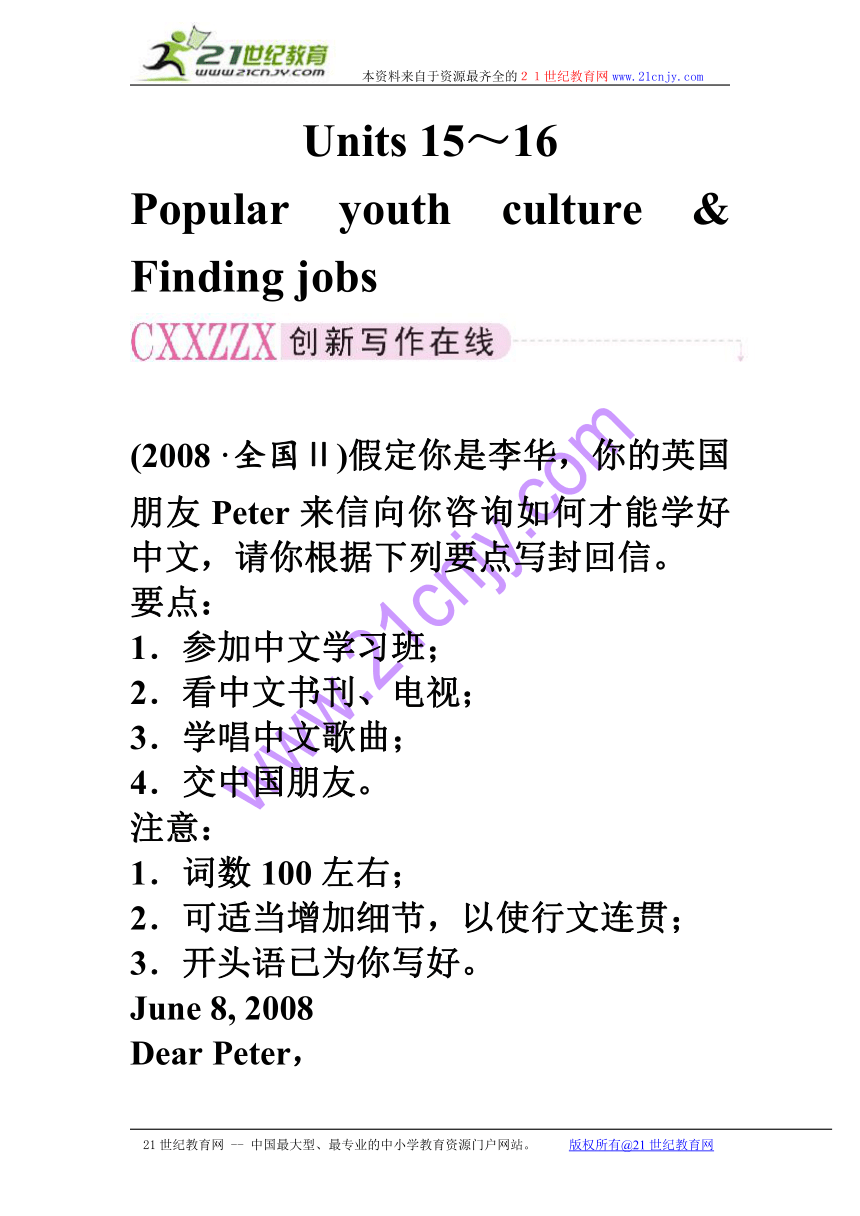
|
|
| 格式 | rar | ||
| 文件大小 | 163.1KB | ||
| 资源类型 | 教案 | ||
| 版本资源 | 人教版 | ||
| 科目 | 英语 | ||
| 更新时间 | 2013-11-24 00:00:00 | ||
图片预览

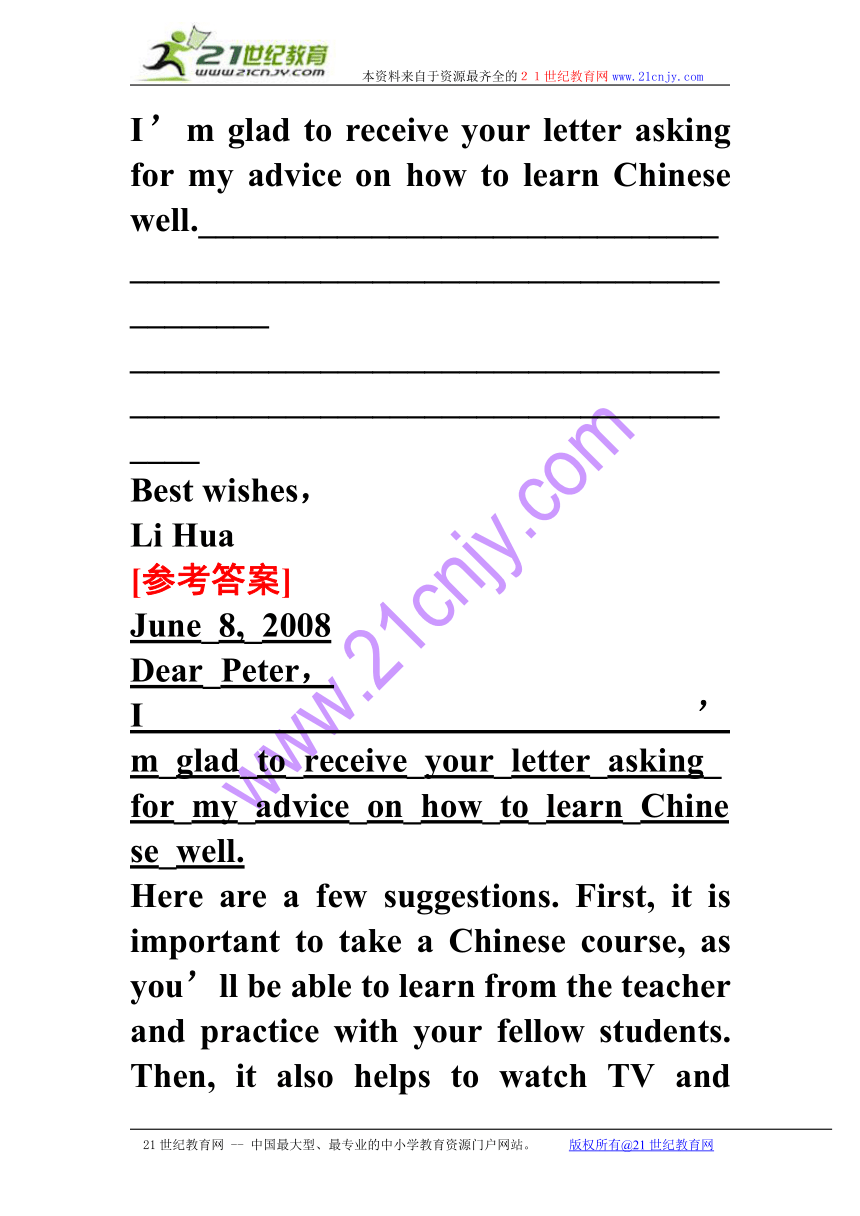
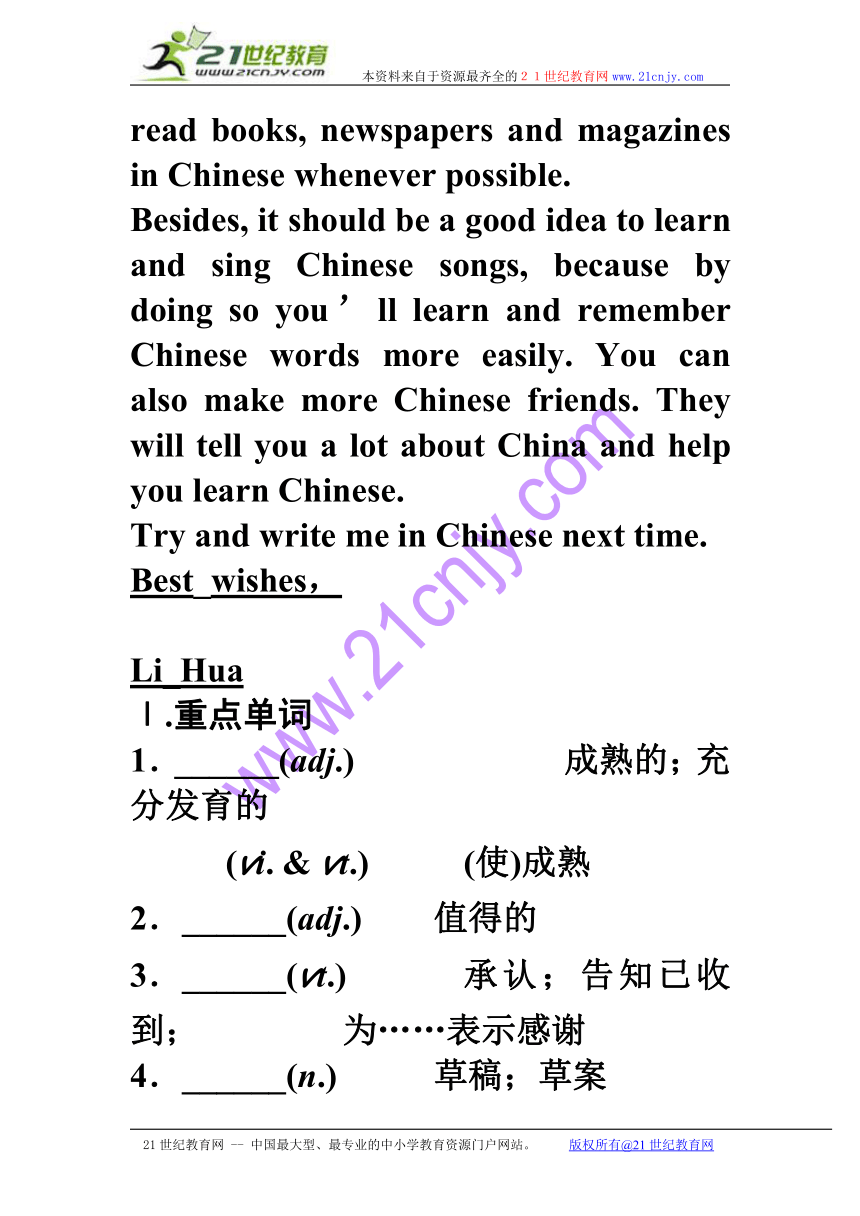
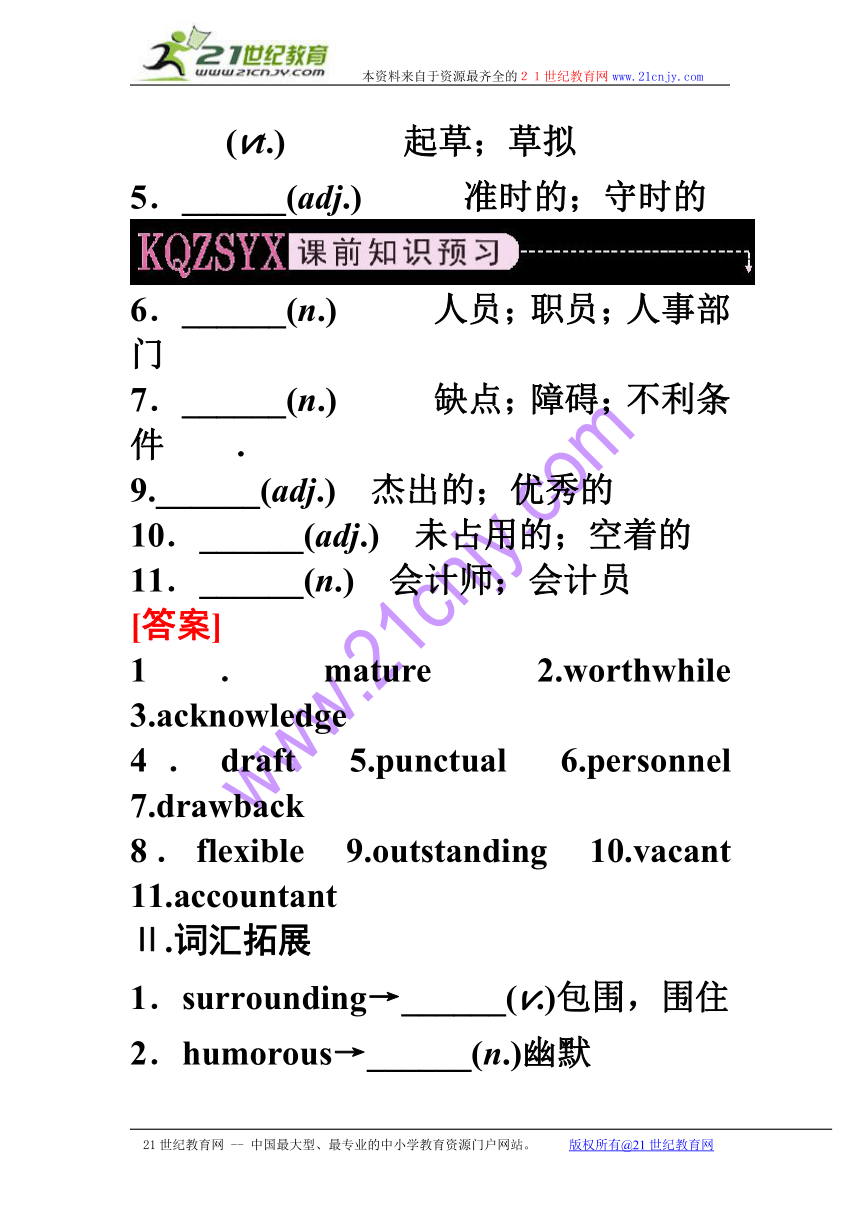
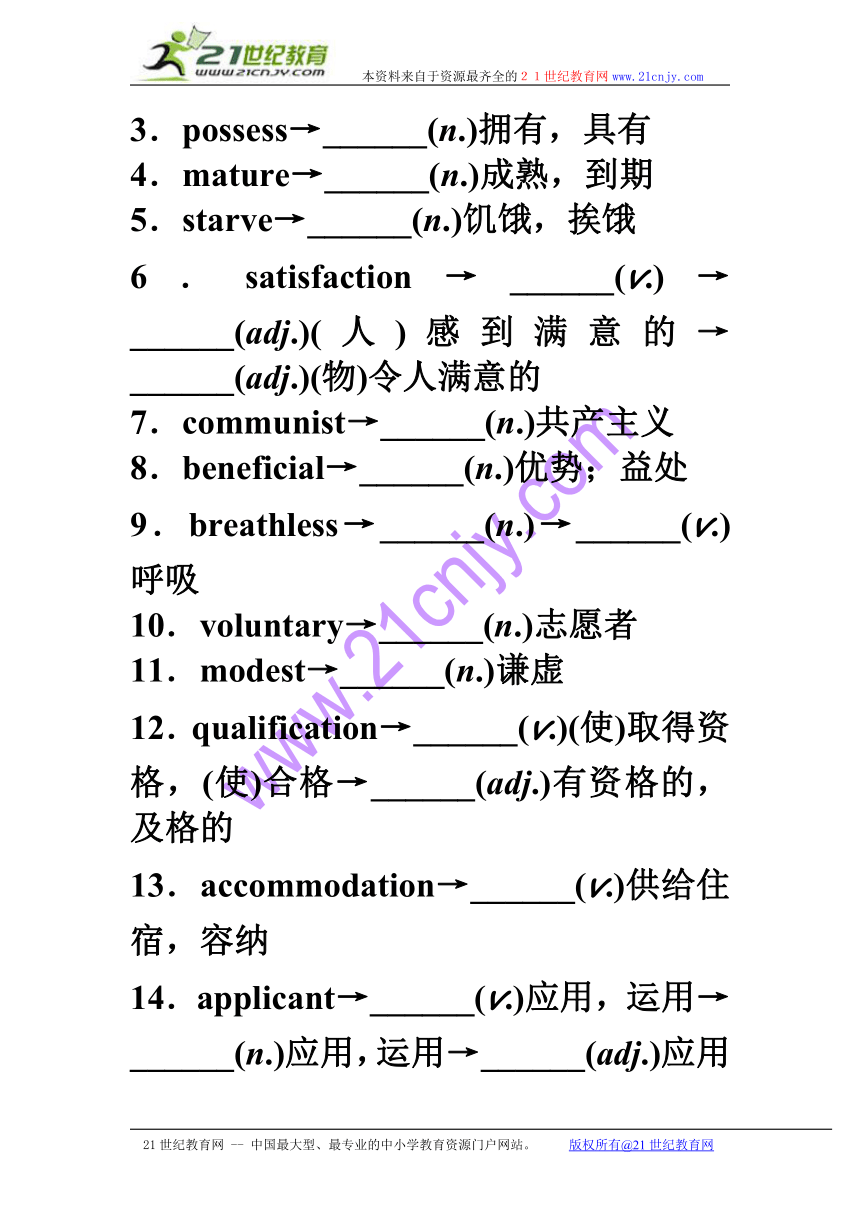
文档简介
本资料来自于资源最齐全的21世纪教育网www.21cnjy.com
Units 15~16
Popular youth culture & Finding jobs
(2008·全国Ⅱ)假定你是李华,你的英国朋友Peter来信向你咨询如何才能学好中文,请你根据下列要点写封回信。
要点:
1.参加中文学习班;
2.看中文书刊、电视;
3.学唱中文歌曲;
4.交中国朋友。
注意:
1.词数100左右;
2.可适当增加细节,以使行文连贯;
3.开头语已为你写好。
June 8, 2008
Dear Peter,
I’m glad to receive your letter asking for my advice on how to learn Chinese well.________________________________________________________________________
________________________________________________________________________
Best wishes,
Li Hua
[参考答案]
June_8,_2008
Dear_Peter,
I’m_glad_to_receive_your_letter_asking_for_my_advice_on_how_to_learn_Chinese_well.
Here are a few suggestions. First, it is important to take a Chinese course, as you’ll be able to learn from the teacher and practice with your fellow students. Then, it also helps to watch TV and read books, newspapers and magazines in Chinese whenever possible.
Besides, it should be a good idea to learn and sing Chinese songs, because by doing so you’ll learn and remember Chinese words more easily. You can also make more Chinese friends. They will tell you a lot about China and help you learn Chinese.
Try and write me in Chinese next time.
Best_wishes,
Li_Hua
Ⅰ.重点单词
1.______(adj.) 成熟的;充分发育的
(vi. & vt.) (使)成熟
2.______(adj.) 值得的
3.______(vt.) 承认;告知已收到; 为……表示感谢
4.______(n.) 草稿;草案
(vt.) 起草;草拟
5.______(adj.) 准时的;守时的
6.______(n.) 人员;职员;人事部门
7.______(n.) 缺点;障碍;不利条件 .
9.______(adj.) 杰出的;优秀的
10.______(adj.) 未占用的;空着的
11.______(n.) 会计师;会计员
[答案]
1.mature 2.worthwhile 3.acknowledge
4.draft 5.punctual 6.personnel 7.drawback
8.flexible 9.outstanding 10.vacant 11.accountant
Ⅱ.词汇拓展
1.surrounding→______(v.)包围,围住
2.humorous→______(n.)幽默
3.possess→______(n.)拥有,具有
4.mature→______(n.)成熟,到期
5.starve→______(n.)饥饿,挨饿
6.satisfaction→______(v.)→______(adj.)(人)感到满意的→______(adj.)(物)令人满意的
7.communist→______(n.)共产主义
8.beneficial→______(n.)优势;益处
9.breathless→______(n.)→______(v.)呼吸
10.voluntary→______(n.)志愿者
11.modest→______(n.)谦虚
12.qualification→______(v.)(使)取得资格,(使)合格→______(adj.)有资格的,及格的
13.accommodation→______(v.)供给住宿,容纳
14.applicant→______(v.)应用,运用→______(n.)应用,运用→______(adj.)应用的,实用的
15.instant→______(n.)例子
16.occupation→______(v.)占领,占据
17.assess→______(n.)→______(n.)估价员,陪审员
18.vacant→______(n.)空余,空位
19.adore→______(adj.)迷人的,可爱的→______(n.)热爱,爱慕
[答案]
1.surround 2.humo(u)r 3.possession 4.maturity
5.starvation 6.satisfy; satisfied; satisfying
7.communism 8.benefit 9.breath; breathe
10.volunteer 11.modesty 12.qualify; qualified
13.accommodate 14.apply; application; applied
15.instance 16.occupy 17.assessment; assessor
18.vacancy 19.adorable; adoration
Ⅲ.重点短语
1.______ fashion 过时的,不流行的
2.raise money ______ 为……筹钱
3.apply ______ 申请,请求
4.make a contribution ______ 对……做贡献
5.open ______ 开启
6.due ______ 因为
7.fit ______(with) 与……相适应;与……相
协调
8.straight ______ 立刻地;毫不犹豫地
9.all ______ 全身,到处
10.as ______ as 既……又……
11.______ one’s ambition 实现某人的理想
12.send ______ 寄出;派遣;给……送行
13.hold ______ 退缩;踌躇
14.______ to date 现代的;时新的;据目前
所知的
15.______ touch with 保持联系;了解
[答案]
1.out of 2.for 3.for 4.to 5.up 6.to
7.in 8.away 9.over 10.well 11.achieve
12.off 13.back 14.up 15.in
Ⅳ.重点句型
1....students wearing jeans to school...学生们穿牛仔裤上学……
2....made me realize how lucky I am to...……使我意识到我是多么幸运……
3.David’s career took off almost immediately when he was part of the Manchester United’s Youth Team that won the FA Youth Cup in 1992.当……大卫的事业开始起色。
4....football is such a fiercely competitive occupation that many players are not successful...……足球运动是竞争如此激烈的职业以致……
Ⅰ.词汇聚焦
1.acknowledge vt.①承认,承认……的权威(或主张)②告知收到,确认③对……表示谢意;报偿
搭配:It is universally acknowledged that...……是大家所公认的;acknowledge one’s defeat承认失败;acknowledge (the receipt of) a letter表示收到来信;acknowledge the applause谢幕;acknowledge a favor答谢所受到的关照;acknowledge sb. with...以……对某人表示感谢
We acknowledged the need for reform.
我们承认有改革的必要。
I acknowledged the truth of your statement.
我承认你的陈述是真实的。
[指点迷津]
注意用法:acknowledge表示“承认”时,后面可以接名词、代词(acknowledge sth.)、动名词(acknowledge doing sth.)、从句(acknowledge that)、复合结构(acknowledge sb.或sth.+n./acknowledge sb./sth.+as+n.或acknowledge+sb./sth.+to be+n.“承认某人/某物为……”),还可用于被动结构(be acknowledged as.../be acknowledged to be...)。
His long service with the company was ______ with a present.
A. admitted B. acknowledged
C. attributed D. accepted
解析:句意:由于他长期为公司服务,因而公司向他赠送了一件礼物以表谢意。acknowledge此处意为“对……表示谢意”,与with a present“用一件礼品”意义相配。admit“承认(事实、过失等)”;attribute“把……归因于”;accept“接受,认可”。
答案:B
2.nevertheless adv.仍然,然而,不过 conj.虽然如此
nevertheless为表示转折意义的副词,多插在两个句子中间;当句子用连词连接时,则置于表转折意义的句子中间。
My failure in the exam is not unexpected. Nevertheless, it is very disappointing.
我考试不及格是意料之中的事,不过仍然让人很不痛快。
以上例句也可改写为:My failure in the exam is not unexpected but (it is) nevertheless very disappointing./While my failure in the exam is not unexpected, it is nevertheless disappointing.
nevertheless有时也用于句尾。
Although he is hot-tempered. I like him nevertheless.
尽管他脾气暴躁,我还是喜欢他。
[指点迷津]
nevertheless conj.“然而,不过”(与however近义);adv.“仍然,不过”(与yet近义)
This year’s fall in profits was not unexpected. ______, it is very disappointing.
A. Yet B. But
C. Also D. Nevertheless
解析:句意:今年利润下降并不出乎意料,然而它还是令人很失望。nevertheless“然而”;but, yet前面一般用逗号,与后面的句子之间不用逗号。
答案:D
3.instant adj.立即的,即刻的;紧急的;速溶的,调制快速方便的 n.瞬间,时刻
搭配:in an instant立即,当即;on the instant立即,即时;for an instant片刻,一瞬间;at that instant在那个时候,在那一瞬间;be in instant need of help急需帮助;an instant response即时的回答;instant coffee速溶咖啡
扩展:the instant (that)可引导时间状语从句,其句子用一般时表示将来。
He went to sleep the moment that he went to bed.
He went to sleep immediately that he went to bed.
He went to sleep as soon as he went to bed.
他一上床就睡着了。
I will be back in an instant.我马上就回来。
[指点迷津]
注意易混:音近、形近词:instance“例子,实例,事例”;instinct“本能,直觉”
You see the lightning ______ it happens, but you hear the thunder later.
A. the instant B. for an instant
C. on the instant D. in an instant
解析:you see the lightning和it happens是两个完整的句子,因此需要一个连词将它们连接,B、C、D选项都是介词短语,故排除。the instant可用作连词,意思同the moment, as soon as等。
答案:A
4.assess vt.①对……进行估价,确定……的数额②评价,评论
搭配:assess the value of sth. at...把某物估价为……,估计某物的价值为……;assess the damage估计损失;assess sb.’s ability评估某人的能力
扩展:assessment n.估价,评价
assessment of results成果评价
My lawyer assessed the value of my company at £700 000.
我的律师估算我公司的价值为70万英镑。
My income was assessed at $20 000.
我的收入被确定为2万美元。
[指点迷津]
注意易混:音近、形近词:access“通路,接近”。
Examinations are not the only means of ______ someone’s ability.
A. guessing B. assessing
C. valuing D. praising
解析:assess“评价”,主要指对人的能力、价值作出判断、评价;guess“猜测、推测”;value指对人进行评价;praise“表扬”。根据句意,应该是B正确,意为“评价一个人的能力”。
答案:B
Ⅱ.短语突破
Mary joined the local drama club but didn’t seem to fit in, so she left.
玛丽参加了当地的戏剧俱乐部,但她似乎不适应那儿的环境,因此就退出了。
His ideas did not quite fit in with our aims.
他的主意同我们的目标并不完全一致。
[指点迷津]
fit in为不及物动词词组,其后不带宾语;fit in with其后要带宾语。
He’s never done this type of work before; I’m not sure how he’ll ______ the other employees.
A. fit in B. fit with
C. fit to D. fit in with
解析:fit in with sb.“与某人相协调、配合好”。
答案:D
2.straight away立刻;毫不犹豫地
以下短语也有“立刻,马上”之意:at once/right away/immediately, without delay.
I’ll do it straight away if you’re in a hurry.
如果你赶时间的话,我立刻就做。
I want it typed straight away, please.
请立即把它打印出来。
[指点迷津]
straight away=straight off
—Can you order me a taxi, please
—______, sir.
A. Straight away B. Without delay
C. Right now D. At this moment
解析:straight away“立刻、马上”;without delay“毫不犹豫地”;right now=at this moment=now“现在,就在此时”;根据上下文语境,回答是:“好的,先生,立刻就办”。
答案:A
3.
The police were unable to hold back the crowd.
警方不能阻挡住人群。
He held up one finger and showed it to the class.
他举起一根手指,向同学们晃了晃。
The traffic was held up by an accident.
因为一场事故,交通被阻塞了。
[指点迷津]
hold on的反义词是ring off; hold back作“阻挡”讲时,与hold up同义。
We thought of selling this old furniture, but we’ve decided to ______ it. It might be valuable.
A. hold on to B. keep up with
C. turn to D. look after
解析:本题考查短语动词辨析。hold on to“不出让,不肯出手”;keep up with“跟上”;turn to“转向”;look after“照料,照看”。B、C、D三项不合题意,句意:我们想到过把这旧家具卖掉,但还是决定不卖了,这旧家具可能有价值。
答案:A
Ⅲ.句型归纳
1.It was evident that the circle dance told...很显然,……
It was also apparent that the wagging dance,...……也很明显。
[思维拓展]
It+be+adj./p.p.+
在此句型中,it是形式主语,真正的主语是that从句或wh-从句。如:
It was obvious that the driver couldn’t control the car.很明显,司机已不能控制他的车了。
It is not known when she did it.
她什么时候做的那件事还不清楚。
It’s pretty well understood ______ controls the flow of carbon dioxide in and out the atmosphere today.
A. that B. where
C. what D. how
解析:it是形式主语,真正的主语则是要完成的从句,在从句中,谓语动词controls缺少主语,that在名词性从句中只起引导作用不充当任何成分,where和how也不用作主语,而what可作主语。
答案:C
2....I am having a great time doing it.……我正为改善西部的教育努力着,感到很快乐。
[思维拓展]
have a great/good/bad time(in) doing sth./with+名词
做……快乐/不快乐
have difficulty/trouble/fun/problem (in) doing/with+名词
做……有困难/麻烦/快乐/问题
They have great trouble finding you.
他们费尽周折才找到你。
The children have fun with the festivals.
孩子们在过节中找到了乐趣。
Having been ill in bed for nearly a month, he had a hard time ______ the exam.
A. pass B. to pass
C. passed D. passing
解析:据以上所讲解的词组,此题中正是have a hard time doing sth.,故只有D项合乎这一搭配。
答案:D
3.Denim jeans are a symbol of the global teenager and it seems likely that they will remain part of international youth culture for many years to come.牛仔裤是全球青少年的一种象征,并且很有可能在未来的许多年里仍将是国际青少年文化的一部分。
It seems likely that...似乎有可能……。
[思维拓展]
sth. is likely to do ……有可能……。
sb. is likely to do某人有可能……。
It is likely that ……有可能……。
sth. is possible某事有可能。
It is possible/probable that ……有可能。
[指点迷津]
likely, probable与possible
likely属常用词,指“从表面迹象来看很有可能”。比probable的可能性要小,比possible要大。
possible指“由于有适当的条件和方法,某事可能发生或做到”,强调“客观上有可能”,但常含有“实际希望很小”的意思。
probable语气比possible强,指“有根据、合情理、值得相信的事物,带有‘大概’,‘很可能’”的意思。
likely之后常跟不定式(be likely to do sth.),而possible, probable之后通常不跟不定式;likely的主语可以是人,而possible, probable的主语不能是人。
Success is possible, but hardly probable.
成功是有可能的,但把握性不大。
She is not likely to come next month.(主语为“人”时,用likely)她下月很可能不来。
It is not ______ that he will win; I only could say he is ______ to.
A. sure; likely
B. certain; possible
C. certain; likely
D. sure; possible
解析:在It is certain that从句中,certain不可用sure替换;在sb. is likely to do中,likely不可换为possible或probable。
答案:C
4.Every time he plays football he is...每当他踢足球时,他……
every time短语引导一从句来作状语,意为“每当……”。
[思维拓展]
①有些time的短语,如the first/last time可引导一从句作时间状语,意为“第一次/最后一次……的时候”。如:
The first time I met him, I fell in love with him.
第一次见到他的时候,我就爱上了他。
②还有一些名词短语,如the moment/minute/second/instant也可引导一时间状语从句,意为“一……就……”。如:
I sent you the news the instant I heard it.
我一听到消息便通知了你。
③某些副词immediately/directly/instantly等也可引导时间状语从句,意为“一……就……”。
I called him immediately I had time.
我一有空就给他打电话。
[指点迷津]
在这一类时间状语从句中,不可用进行时态,要用一般现在时代替一般将来时。
—Did you remember to give Mary the money you owed her
—Yes, I gave it to her ______ I saw her.
A. while B. the moment
C. suddenly D. once
解析:while引导的从句中要用延续动词,而see在此句中是“看见”为短暂动词,C项不可引导从句,D项引导的是条件从句,the moment=as soon as。
答案:B
21世纪教育网 -- 中国最大型、最专业的中小学教育资源门户网站。 版权所有@21世纪教育网
Units 15~16
Popular youth culture & Finding jobs
(2008·全国Ⅱ)假定你是李华,你的英国朋友Peter来信向你咨询如何才能学好中文,请你根据下列要点写封回信。
要点:
1.参加中文学习班;
2.看中文书刊、电视;
3.学唱中文歌曲;
4.交中国朋友。
注意:
1.词数100左右;
2.可适当增加细节,以使行文连贯;
3.开头语已为你写好。
June 8, 2008
Dear Peter,
I’m glad to receive your letter asking for my advice on how to learn Chinese well.________________________________________________________________________
________________________________________________________________________
Best wishes,
Li Hua
[参考答案]
June_8,_2008
Dear_Peter,
I’m_glad_to_receive_your_letter_asking_for_my_advice_on_how_to_learn_Chinese_well.
Here are a few suggestions. First, it is important to take a Chinese course, as you’ll be able to learn from the teacher and practice with your fellow students. Then, it also helps to watch TV and read books, newspapers and magazines in Chinese whenever possible.
Besides, it should be a good idea to learn and sing Chinese songs, because by doing so you’ll learn and remember Chinese words more easily. You can also make more Chinese friends. They will tell you a lot about China and help you learn Chinese.
Try and write me in Chinese next time.
Best_wishes,
Li_Hua
Ⅰ.重点单词
1.______(adj.) 成熟的;充分发育的
(vi. & vt.) (使)成熟
2.______(adj.) 值得的
3.______(vt.) 承认;告知已收到; 为……表示感谢
4.______(n.) 草稿;草案
(vt.) 起草;草拟
5.______(adj.) 准时的;守时的
6.______(n.) 人员;职员;人事部门
7.______(n.) 缺点;障碍;不利条件 .
9.______(adj.) 杰出的;优秀的
10.______(adj.) 未占用的;空着的
11.______(n.) 会计师;会计员
[答案]
1.mature 2.worthwhile 3.acknowledge
4.draft 5.punctual 6.personnel 7.drawback
8.flexible 9.outstanding 10.vacant 11.accountant
Ⅱ.词汇拓展
1.surrounding→______(v.)包围,围住
2.humorous→______(n.)幽默
3.possess→______(n.)拥有,具有
4.mature→______(n.)成熟,到期
5.starve→______(n.)饥饿,挨饿
6.satisfaction→______(v.)→______(adj.)(人)感到满意的→______(adj.)(物)令人满意的
7.communist→______(n.)共产主义
8.beneficial→______(n.)优势;益处
9.breathless→______(n.)→______(v.)呼吸
10.voluntary→______(n.)志愿者
11.modest→______(n.)谦虚
12.qualification→______(v.)(使)取得资格,(使)合格→______(adj.)有资格的,及格的
13.accommodation→______(v.)供给住宿,容纳
14.applicant→______(v.)应用,运用→______(n.)应用,运用→______(adj.)应用的,实用的
15.instant→______(n.)例子
16.occupation→______(v.)占领,占据
17.assess→______(n.)→______(n.)估价员,陪审员
18.vacant→______(n.)空余,空位
19.adore→______(adj.)迷人的,可爱的→______(n.)热爱,爱慕
[答案]
1.surround 2.humo(u)r 3.possession 4.maturity
5.starvation 6.satisfy; satisfied; satisfying
7.communism 8.benefit 9.breath; breathe
10.volunteer 11.modesty 12.qualify; qualified
13.accommodate 14.apply; application; applied
15.instance 16.occupy 17.assessment; assessor
18.vacancy 19.adorable; adoration
Ⅲ.重点短语
1.______ fashion 过时的,不流行的
2.raise money ______ 为……筹钱
3.apply ______ 申请,请求
4.make a contribution ______ 对……做贡献
5.open ______ 开启
6.due ______ 因为
7.fit ______(with) 与……相适应;与……相
协调
8.straight ______ 立刻地;毫不犹豫地
9.all ______ 全身,到处
10.as ______ as 既……又……
11.______ one’s ambition 实现某人的理想
12.send ______ 寄出;派遣;给……送行
13.hold ______ 退缩;踌躇
14.______ to date 现代的;时新的;据目前
所知的
15.______ touch with 保持联系;了解
[答案]
1.out of 2.for 3.for 4.to 5.up 6.to
7.in 8.away 9.over 10.well 11.achieve
12.off 13.back 14.up 15.in
Ⅳ.重点句型
1....students wearing jeans to school...学生们穿牛仔裤上学……
2....made me realize how lucky I am to...……使我意识到我是多么幸运……
3.David’s career took off almost immediately when he was part of the Manchester United’s Youth Team that won the FA Youth Cup in 1992.当……大卫的事业开始起色。
4....football is such a fiercely competitive occupation that many players are not successful...……足球运动是竞争如此激烈的职业以致……
Ⅰ.词汇聚焦
1.acknowledge vt.①承认,承认……的权威(或主张)②告知收到,确认③对……表示谢意;报偿
搭配:It is universally acknowledged that...……是大家所公认的;acknowledge one’s defeat承认失败;acknowledge (the receipt of) a letter表示收到来信;acknowledge the applause谢幕;acknowledge a favor答谢所受到的关照;acknowledge sb. with...以……对某人表示感谢
We acknowledged the need for reform.
我们承认有改革的必要。
I acknowledged the truth of your statement.
我承认你的陈述是真实的。
[指点迷津]
注意用法:acknowledge表示“承认”时,后面可以接名词、代词(acknowledge sth.)、动名词(acknowledge doing sth.)、从句(acknowledge that)、复合结构(acknowledge sb.或sth.+n./acknowledge sb./sth.+as+n.或acknowledge+sb./sth.+to be+n.“承认某人/某物为……”),还可用于被动结构(be acknowledged as.../be acknowledged to be...)。
His long service with the company was ______ with a present.
A. admitted B. acknowledged
C. attributed D. accepted
解析:句意:由于他长期为公司服务,因而公司向他赠送了一件礼物以表谢意。acknowledge此处意为“对……表示谢意”,与with a present“用一件礼品”意义相配。admit“承认(事实、过失等)”;attribute“把……归因于”;accept“接受,认可”。
答案:B
2.nevertheless adv.仍然,然而,不过 conj.虽然如此
nevertheless为表示转折意义的副词,多插在两个句子中间;当句子用连词连接时,则置于表转折意义的句子中间。
My failure in the exam is not unexpected. Nevertheless, it is very disappointing.
我考试不及格是意料之中的事,不过仍然让人很不痛快。
以上例句也可改写为:My failure in the exam is not unexpected but (it is) nevertheless very disappointing./While my failure in the exam is not unexpected, it is nevertheless disappointing.
nevertheless有时也用于句尾。
Although he is hot-tempered. I like him nevertheless.
尽管他脾气暴躁,我还是喜欢他。
[指点迷津]
nevertheless conj.“然而,不过”(与however近义);adv.“仍然,不过”(与yet近义)
This year’s fall in profits was not unexpected. ______, it is very disappointing.
A. Yet B. But
C. Also D. Nevertheless
解析:句意:今年利润下降并不出乎意料,然而它还是令人很失望。nevertheless“然而”;but, yet前面一般用逗号,与后面的句子之间不用逗号。
答案:D
3.instant adj.立即的,即刻的;紧急的;速溶的,调制快速方便的 n.瞬间,时刻
搭配:in an instant立即,当即;on the instant立即,即时;for an instant片刻,一瞬间;at that instant在那个时候,在那一瞬间;be in instant need of help急需帮助;an instant response即时的回答;instant coffee速溶咖啡
扩展:the instant (that)可引导时间状语从句,其句子用一般时表示将来。
He went to sleep the moment that he went to bed.
He went to sleep immediately that he went to bed.
He went to sleep as soon as he went to bed.
他一上床就睡着了。
I will be back in an instant.我马上就回来。
[指点迷津]
注意易混:音近、形近词:instance“例子,实例,事例”;instinct“本能,直觉”
You see the lightning ______ it happens, but you hear the thunder later.
A. the instant B. for an instant
C. on the instant D. in an instant
解析:you see the lightning和it happens是两个完整的句子,因此需要一个连词将它们连接,B、C、D选项都是介词短语,故排除。the instant可用作连词,意思同the moment, as soon as等。
答案:A
4.assess vt.①对……进行估价,确定……的数额②评价,评论
搭配:assess the value of sth. at...把某物估价为……,估计某物的价值为……;assess the damage估计损失;assess sb.’s ability评估某人的能力
扩展:assessment n.估价,评价
assessment of results成果评价
My lawyer assessed the value of my company at £700 000.
我的律师估算我公司的价值为70万英镑。
My income was assessed at $20 000.
我的收入被确定为2万美元。
[指点迷津]
注意易混:音近、形近词:access“通路,接近”。
Examinations are not the only means of ______ someone’s ability.
A. guessing B. assessing
C. valuing D. praising
解析:assess“评价”,主要指对人的能力、价值作出判断、评价;guess“猜测、推测”;value指对人进行评价;praise“表扬”。根据句意,应该是B正确,意为“评价一个人的能力”。
答案:B
Ⅱ.短语突破
Mary joined the local drama club but didn’t seem to fit in, so she left.
玛丽参加了当地的戏剧俱乐部,但她似乎不适应那儿的环境,因此就退出了。
His ideas did not quite fit in with our aims.
他的主意同我们的目标并不完全一致。
[指点迷津]
fit in为不及物动词词组,其后不带宾语;fit in with其后要带宾语。
He’s never done this type of work before; I’m not sure how he’ll ______ the other employees.
A. fit in B. fit with
C. fit to D. fit in with
解析:fit in with sb.“与某人相协调、配合好”。
答案:D
2.straight away立刻;毫不犹豫地
以下短语也有“立刻,马上”之意:at once/right away/immediately, without delay.
I’ll do it straight away if you’re in a hurry.
如果你赶时间的话,我立刻就做。
I want it typed straight away, please.
请立即把它打印出来。
[指点迷津]
straight away=straight off
—Can you order me a taxi, please
—______, sir.
A. Straight away B. Without delay
C. Right now D. At this moment
解析:straight away“立刻、马上”;without delay“毫不犹豫地”;right now=at this moment=now“现在,就在此时”;根据上下文语境,回答是:“好的,先生,立刻就办”。
答案:A
3.
The police were unable to hold back the crowd.
警方不能阻挡住人群。
He held up one finger and showed it to the class.
他举起一根手指,向同学们晃了晃。
The traffic was held up by an accident.
因为一场事故,交通被阻塞了。
[指点迷津]
hold on的反义词是ring off; hold back作“阻挡”讲时,与hold up同义。
We thought of selling this old furniture, but we’ve decided to ______ it. It might be valuable.
A. hold on to B. keep up with
C. turn to D. look after
解析:本题考查短语动词辨析。hold on to“不出让,不肯出手”;keep up with“跟上”;turn to“转向”;look after“照料,照看”。B、C、D三项不合题意,句意:我们想到过把这旧家具卖掉,但还是决定不卖了,这旧家具可能有价值。
答案:A
Ⅲ.句型归纳
1.It was evident that the circle dance told...很显然,……
It was also apparent that the wagging dance,...……也很明显。
[思维拓展]
It+be+adj./p.p.+
在此句型中,it是形式主语,真正的主语是that从句或wh-从句。如:
It was obvious that the driver couldn’t control the car.很明显,司机已不能控制他的车了。
It is not known when she did it.
她什么时候做的那件事还不清楚。
It’s pretty well understood ______ controls the flow of carbon dioxide in and out the atmosphere today.
A. that B. where
C. what D. how
解析:it是形式主语,真正的主语则是要完成的从句,在从句中,谓语动词controls缺少主语,that在名词性从句中只起引导作用不充当任何成分,where和how也不用作主语,而what可作主语。
答案:C
2....I am having a great time doing it.……我正为改善西部的教育努力着,感到很快乐。
[思维拓展]
have a great/good/bad time(in) doing sth./with+名词
做……快乐/不快乐
have difficulty/trouble/fun/problem (in) doing/with+名词
做……有困难/麻烦/快乐/问题
They have great trouble finding you.
他们费尽周折才找到你。
The children have fun with the festivals.
孩子们在过节中找到了乐趣。
Having been ill in bed for nearly a month, he had a hard time ______ the exam.
A. pass B. to pass
C. passed D. passing
解析:据以上所讲解的词组,此题中正是have a hard time doing sth.,故只有D项合乎这一搭配。
答案:D
3.Denim jeans are a symbol of the global teenager and it seems likely that they will remain part of international youth culture for many years to come.牛仔裤是全球青少年的一种象征,并且很有可能在未来的许多年里仍将是国际青少年文化的一部分。
It seems likely that...似乎有可能……。
[思维拓展]
sth. is likely to do ……有可能……。
sb. is likely to do某人有可能……。
It is likely that ……有可能……。
sth. is possible某事有可能。
It is possible/probable that ……有可能。
[指点迷津]
likely, probable与possible
likely属常用词,指“从表面迹象来看很有可能”。比probable的可能性要小,比possible要大。
possible指“由于有适当的条件和方法,某事可能发生或做到”,强调“客观上有可能”,但常含有“实际希望很小”的意思。
probable语气比possible强,指“有根据、合情理、值得相信的事物,带有‘大概’,‘很可能’”的意思。
likely之后常跟不定式(be likely to do sth.),而possible, probable之后通常不跟不定式;likely的主语可以是人,而possible, probable的主语不能是人。
Success is possible, but hardly probable.
成功是有可能的,但把握性不大。
She is not likely to come next month.(主语为“人”时,用likely)她下月很可能不来。
It is not ______ that he will win; I only could say he is ______ to.
A. sure; likely
B. certain; possible
C. certain; likely
D. sure; possible
解析:在It is certain that从句中,certain不可用sure替换;在sb. is likely to do中,likely不可换为possible或probable。
答案:C
4.Every time he plays football he is...每当他踢足球时,他……
every time短语引导一从句来作状语,意为“每当……”。
[思维拓展]
①有些time的短语,如the first/last time可引导一从句作时间状语,意为“第一次/最后一次……的时候”。如:
The first time I met him, I fell in love with him.
第一次见到他的时候,我就爱上了他。
②还有一些名词短语,如the moment/minute/second/instant也可引导一时间状语从句,意为“一……就……”。如:
I sent you the news the instant I heard it.
我一听到消息便通知了你。
③某些副词immediately/directly/instantly等也可引导时间状语从句,意为“一……就……”。
I called him immediately I had time.
我一有空就给他打电话。
[指点迷津]
在这一类时间状语从句中,不可用进行时态,要用一般现在时代替一般将来时。
—Did you remember to give Mary the money you owed her
—Yes, I gave it to her ______ I saw her.
A. while B. the moment
C. suddenly D. once
解析:while引导的从句中要用延续动词,而see在此句中是“看见”为短暂动词,C项不可引导从句,D项引导的是条件从句,the moment=as soon as。
答案:B
21世纪教育网 -- 中国最大型、最专业的中小学教育资源门户网站。 版权所有@21世纪教育网
同课章节目录
